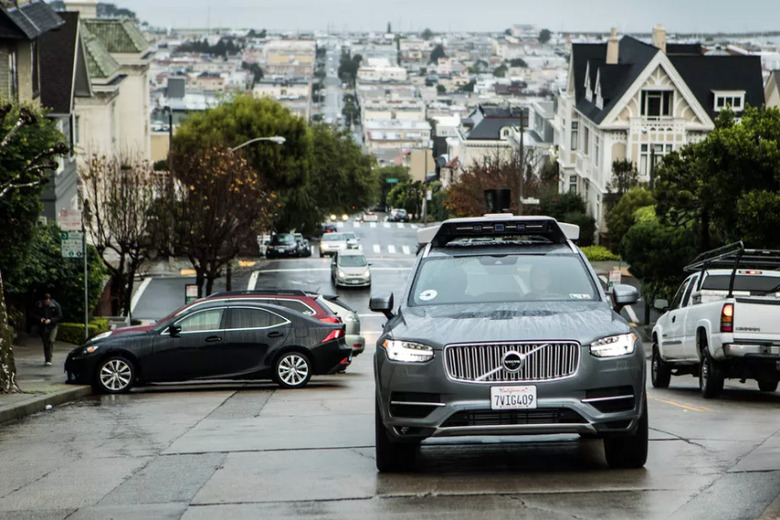The Inside Story Of One Of The Biggest Fights In Self-Driving Car Tech
One of the next big things in tech that we're going to experience in the coming years is autonomous cars. Various companies are developing self-driving car systems right now, with Google, Tesla, and Uber among the current leaders in the emerging space. And two of those companies are about to clash in a court battle that might determine the early winner of the self-driving car race.
Google, some would say, is in an advantageous position. It's not a car maker, but it has developed a self-driving car project that's probably ahead of anything in the works from bigger players in the automotive industry.
But Google recently lost a key engineer who's been working on Google's self-driving cars for a decade. Anthony Levandowski went on to found Otto, a self-driving truck company that was acquired by Uber last year for $700 million. A few weeks ago, Waymo, which is Google's driverless car spinoff — sued Uber for trade secret theft and patent infringement after discovering that Levandowski developed a lidar system for Uber that copies the lider setup he created for Google.
Who's right and who's wrong? Bloomberg Businessweek has the inside story on this particular dispute, which reveals the complexities of these emerging technologies, but also their potential.
Google started investigating Levandowski last summer after Uber bought Otto, and discovered he allegedly used a company laptop to copy about 14,000 design files from Waymo to a card reader, before wiping all the data from the laptop. Google, however, did not act on its findings until December 13th, when a Google employee received an email that a supplier wanted to send to Otto. In the message was a drawing of a lidar circuit board that had Otto's name on it but looked identical to Google.
Bloomberg explains that it's a Google policy not to sue former employees for patent infringement, something engineers frequently find out about during orientation. If, however, Google does decide to move to a patent-based trial against a former employee, then it means the person has done something seriously wrong, the report says.
Lidar is a component that allows cars to see their surroundings, which is obviously a key feature for self-driving cars. A multi-lens off-the-shelf sensor costs $80,000, but Google developed a single-lens lidar system that's a lot cheaper. The report reveals that it was actually Levandowski's lidar team that came up with the creation.
Bloomberg explains that Levandowski founded two other companies before Otto that were developing self-driving car products while he was working on the same products at Google. Google eventually purchased both firms. The report also goes on to say that Google decided to let Levandowski work on his side projects, even if that meant skipping work. After one internal dispute between the engineer and his boss Chris Urmson, Levandowski skipped work for months to focus on his other projects.
Levandowski butted heads with Urmson about the way Google was supposed to sell self-driving technology. Levandowski wanted each innovation (self-parking or highway pilot) to be sold when ready and retroactively fitted on commercial cars, while Urmson argued for an all-in-one solution, a car that's able to drive itself in all conditions.
Levandowski wasn't necessarily the most popular guy inside Google. Larry Page had to appoint Urmson instead of Levandowski to lead the car team exactly because of the latter's controversial style, which drew criticism among his peers. But the report seems to cement the idea that Levandowski was an essential Google employee, and that he'll further influence the autonomous car market regardless of who prevails in Google's court battle with Uber.
In addition to his engineering skills and his desire to push the technology to the limits of what was possible both from a technical and legal point, the engineer also took matters into his own hands in seeking to legalize self-driving car tests. Levandowski hired a lobbyist in Nevada and wrote a law to allow companies to test autonomous cars with a human driver behind the wheel. He did so without telling Google, which found out only when the person who lobbied for the law sent the company an invoice. The law passed at the end of 2011.
The full report is available at this link, and it's definitely worth a read.
